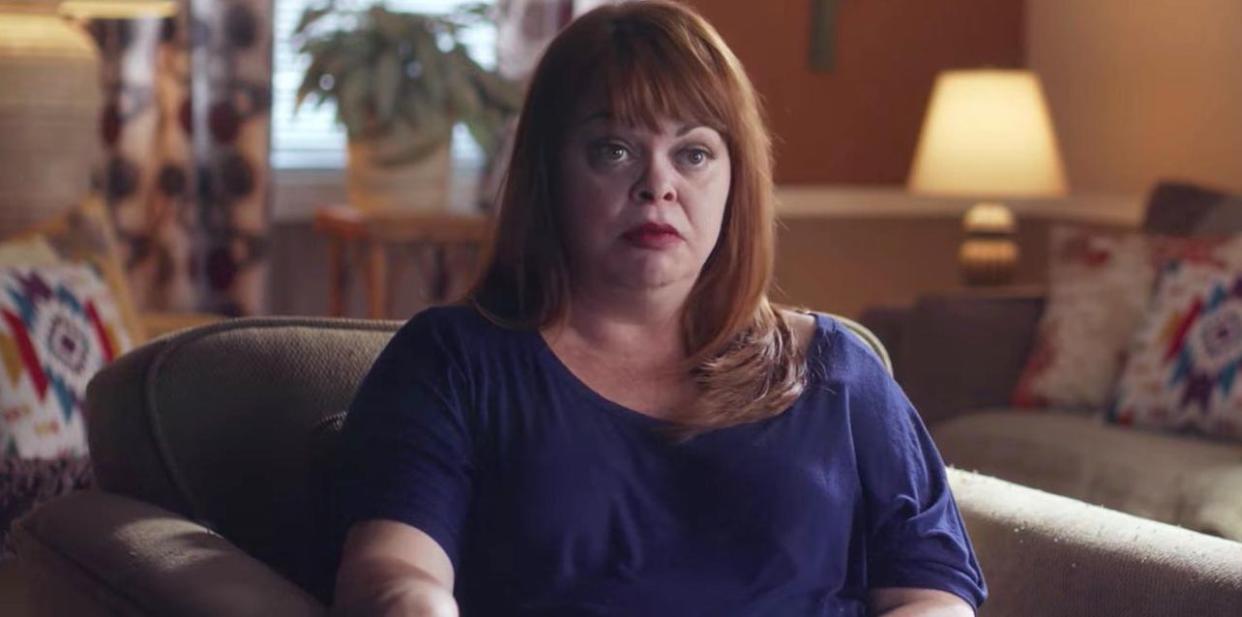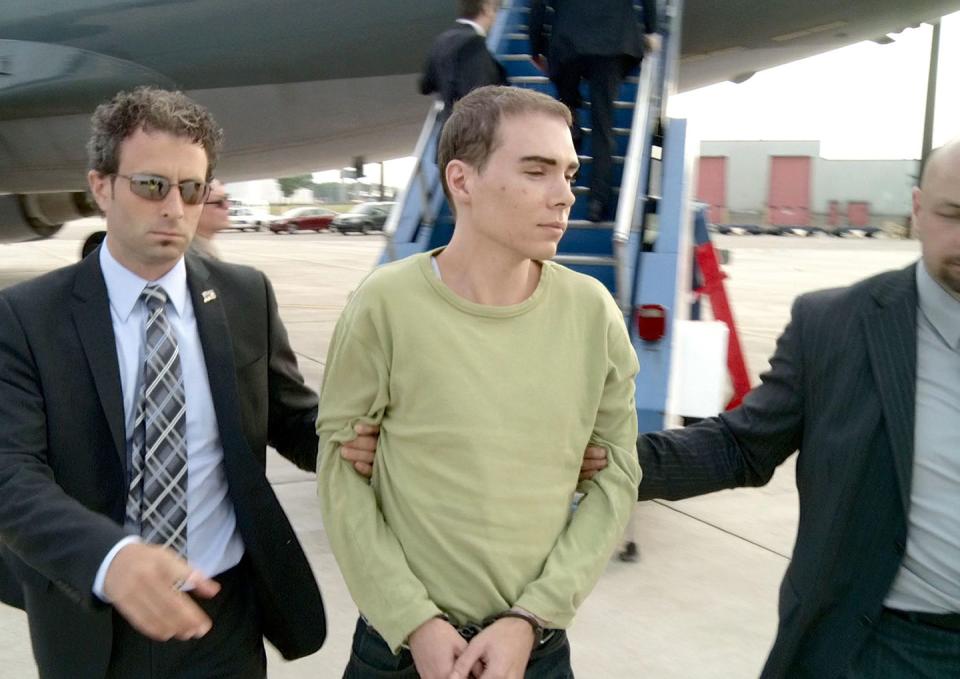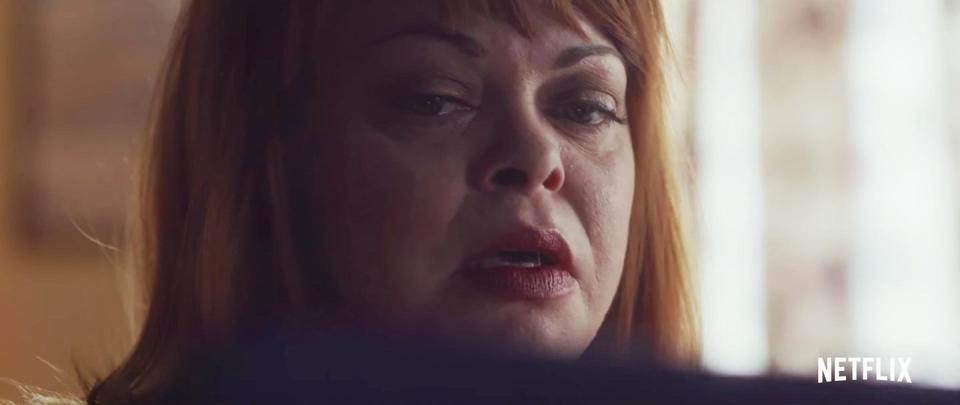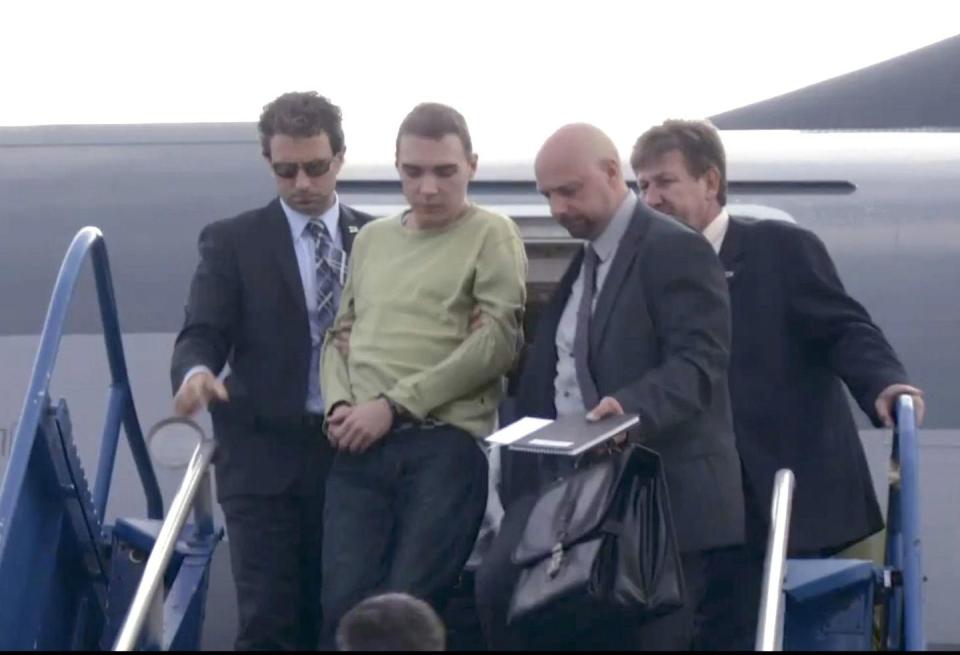Don't F**k With Cats has led to a renewed interest in Luka Magnotta

Note: The following article contains graphic details of crimes that some readers might find upsetting.
Luka Magnotta documentary Don't F**k With Cats really divided viewers when it first dropped on Netflix in December, and interest is still simmering away.
Even the most seasoned of true-crime obsessives can't agree on whether the three-part series falls within the category of being another must-watch binge, or if it missed the mark entirely with its focus on Magnotta's grotesque murder video(s).
Magnotta was convicted in 2014 of murdering Jun Lin, which, disturbingly, he filmed and uploaded to the internet. But has never been prosecuted for the videos that depicted the torture and killing of cats.
In contrast to other documentaries of the same genre, which often put investigators, lawyers or criminal experts at the forefront, Don't F**k With Cats approached the story from the perspective of the amateur internet sleuths who followed and pieced together Magnotta's movements.

Related: Luka Magnotta documentary Don't F**k With Cats leaves out some very important details
Of course, this was an intentional editorial decision from director Mark Lewis, and one that sets the docu-series apart in a time that can only be described as the true-crime renaissance.
In a recent interview with the Telegraph, Lewis made it clear that the project was never going to be "just about murder", and was instead "all about internet culture" and "chasing self-esteem online."
It was detailed in the documentary that Magnotta had been known to create fan accounts for himself in an attempt to boost his online presence. He also cultivated multiple aliases on social media and auditioned for a reality-TV modelling competition. Don't F**k With Cats presents this information as insight into Magnotta's need for attention and fame, something that the sleuths argue was a key motivation behind him filming the cat torture clips and eventually Lin's murder.

Scenes and frames from these murder videos are included in the documentary, something that felt unnecessary even with pixelation and cut-aways. But it does have to be acknowledged that the full extent of what Magnotta did in those clips (which we won't detail here) were not described in the documentary either. "I just didn't think those details needed to be said," Lewis explained, as part of the same interview, also refusing to discuss them further: "I don't want to go into them now."
This was a wise and commendable move (even if we would go one step further and make the argument that none of it should have been shown), but there's one intention which Lewis also laid out that we believe Don't F**k With Cats failed at.
"We really had to hit on the head the idea of complicity: the complicity of the detectives hunting Magnotta down, of the newspaper reporting his story and of the viewers who are fascinated by his story," Lewis said.

Related: What Netflix's Aaron Hernandez documentary got very wrong
In the final moments of the documentary, one of the lead sleuths Deanna Thompson looks directly into the camera (and right into the eyes of the viewer) and asks: "And you, you at home watching a whole f**king documentary about Luka Magnotta – are you complicit? Perhaps it's time we turned off the machine."
In the series, these armchair detectives spent time questioning whether their actions had in fact fed Magnotta's narcissism and perhaps fuelled his criminal behaviour, then turns this back on the viewer to make a broader comment on our fascination with true-crime.
You might have noticed that Luka Magnotta was not interviewed for the series, with his perspective being filled in through the interviews with his mother Anna Yourkin. She was in touch with her son throughout the filming process, apparently phoning him twice a day and visiting regularly.
Having heard about the Netflix documentary from her, Magnotta sent two letters to the director. "They were unsolicited, and we decided not to follow up with an interview," Lewis also told the Telegraph. "We didn't want to give him the platform and there's the nagging question of celebrity."

This echoes the words of the 2012 Interim Liberal Party leader Bob Rae who, following Magnotta's arrest, asked that Canadians mourn the victim rather than "in any way, shape or form" celebrating his notoriety. "Let's not forget that a young man was killed in the most terrible of circumstances," he said at the time.
While we commend Don't F**k With Cats' decision to forgo an interview with Magnotta – which would give him a platform to speak out from behind bars (and potentially reach new audiences) – this doesn't give the documentary a free pass in its involvement of adding to the Magnotta narrative.
It is one of the ongoing ethical dilemmas over the very existence of true-crime as a medium. By its very nature, the genre is always going to have moral implications. We'd argue that it has its place, but that it really comes down to the way in which it is handled and the message it is trying to convey.
Whether it likes it or not, dredging up Luka Magnotta's story and shedding fresh light on his crime – and given Netflix's vast reach, likely introducing it to new people that have never heard of him before – has elevated his notoriety as a killer.
It is not enough to shame the viewer about their decision to view a documentary that is served to them by one of the world's most popular streaming sites, with global reach across almost 200 countries. In most basic terms, you wouldn't make a television show if you didn't expect people to tune in, right?
In the weeks and months that followed the release of the series, news outlets and social media users were publishing think pieces, sharing more gritty details and digging around for further information about the man that could have done such a horrid thing. But you hardly need us to tell you that – you're reading one such piece right now. There are links to more above.
Most troubling of all, it has even been reported recently that "fans" of Magnotta's have formed a Facebook group to discuss his case, once again dissecting and sharing details. What's more, a quick dive into Google trends shows a gigantic surge in audiences searching for his name – disturbingly, more people also started looking for 'Luka Magnotta video' around that time too, and we'll leave it to you to decide what they might have been looking to find.
The renewed interest is an unavoidable by-product of true-crime films, and of course not everyone that enjoys sitting down to a documentary of this kind will then go to these worrying extremes.
But when you think about the documentary's assertion that fame was what Luka Magnotta was after, it's hard to overlook the way in which Don't F**k With Cats has played right into this – especially when it appears that it intended to do the opposite.
In 356BC an arsonist called Herostratus burned down the temple of Artemis at Ephesus specifically to make himself famous. The Ephesians executed him, then made a law forbidding the very mention of his name so that his ambition wouldn't be fulfilled. And yet here we are, 2,376 years later, still talking about him.
Don't F**k With Cats is available now on Netflix.
Digital Spy now has a newsletter – sign up to get it sent straight to your inbox.
Want up-to-the-minute entertainment news and features? Just hit 'Like' on our Digital Spy Facebook page and 'Follow' on our @digitalspy Instagram and Twitter accounts.
You Might Also Like

 Yahoo News
Yahoo News 
